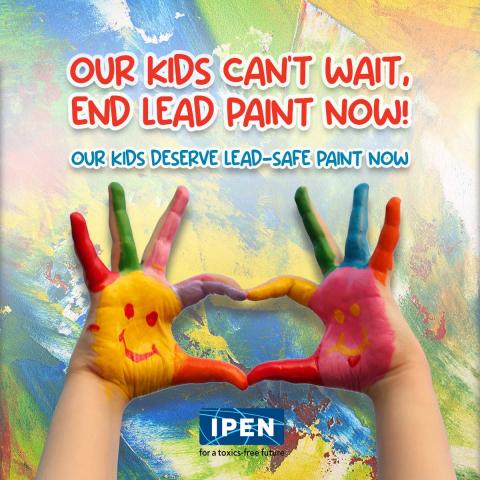Global Health Groups Say: “Our Kids Can’t Wait, End Lead Paint Now!”

IPEN and 50 of its member groups from 40 countries will join the Global Alliance to Eliminate Lead Paint, a joint program of WHO and UNEP, for International Lead Poisoning Prevention Week (ILPPW) this October 23-29, emphasizing the urgent need to protect children’s health through global action to eliminate the use of lead paint. IPEN is a founding member of the Alliance and a member of its Advisory Board. This year’s ILPPW events will mark the tenth anniversary of the annual week-long effort to raise the global profile of ongoing lead poisoning threats, including from lead paint, which continues to be used in the majority of countries around the world.
“We have long known about the toxic threats from lead paint to our children and families, and many countries ended lead paint sales decades ago. Yet in most of the world, lead paint is still used and poses lifelong health threats to millions of children,” said Manny Calonzo, a former IPEN Co-Chair and lead developer of IPEN’s Lead Safe Paint® certification program. “Our kids can’t wait another ten years to eliminate lead paint - we need urgent action to stop this poisoning of our children.”
See the full listing of IPEN member groups’ activities for ILPPW.
Since 2009, IPEN member groups have conducted more than 100 studies on more than 4,000 paints from 59 countries, demonstrating that lead paints are still widely sold in low- and middle-income countries.
Decades of evidence has shown that there is no safe level of exposure to lead. Lead is a potent poison that affects multiple body systems and is particularly harmful to young children. Even at low doses, lead can affect children’s brain development, resulting in reduced IQ, behavioral changes such as reduced attention span and increased antisocial behavior, and reduced educational attainment. Lead exposure can also damage the kidneys, reproductive organs, and the immune system and result in anemia and hypertension. The neurological and behavioral effects of lead are typically irreversible.
To end the use of lead paint, IPEN is calling for:
National, multi-stakeholder actions to adopt regulations banning the use of lead in all paint. National bans should include all types of paint as recommended by the UNEP Model Law and Guidance for Regulating Lead Paint.
Listing of lead chromate under the Rotterdam Convention. Even countries with national bans have difficulty in enforcement when lead chromate, the lead-containing pigments used in paint, continues to be traded globally without prior knowledge or consent. Listing lead chromate would trigger the Convention’s Prior Informed Consent (PIC) procedure and give countries the information they need to reject imports of lead chromate and lead paint.
Ongoing monitoring and enforcement of existing lead paint regulations. National lead paint bans should include provisions for enforcement and consequences for non-compliance.
Stronger action from the paint industry. Paint producers must put the health of children and families first, and adopt practices to end their sales of lead paint. Companies can adopt the Lead Safe Paint® standard, an independent, third-party certification, to assure consumers that their products do not contain added lead.
Additional resources dedicated to global lead paint elimination. This includes support for GAELP to continue to assist national governments in developing and implementing lead paint regulations, and support for strategic activities in countries.
Over the past decade, almost 50 countries have adopted regulations on lead paint or are in the process of doing so. NGOs in the IPEN network have been key actors in moving these laws forward. But despite this progress, more work is urgently needed. Even in countries where lead paint has been banned, older housing with lead paint continues to result in lead-related health problems for millions of children. That is why action to eliminate lead paint globally is urgent – lead paints sold today will continue to pose health threats to children for decades.
